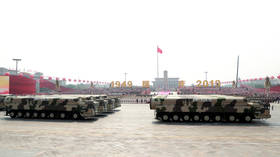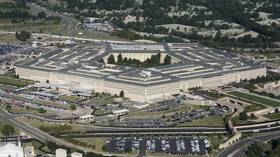US warns of Chinese nuclear breakthrough

China is on the verge of making a breakthrough in its nuclear arms capabilities that would amount to a major shift in global security balance, Admiral Charles Richard, the head of the US Strategic Command, has written in testimony prepared for a hearing on Capitol Hill, Bloomberg reported on Monday.
The official is scheduled to meet the House Defense Appropriations subcommittee at a closed-door hearing on Tuesday. China’s “breathtaking expansion” of its strategic nuclear arsenal means a rapidly escalating risk to Washington, Richard believes.
The admiral particularly refers to an intercontinental ballistic missile-launched hypersonic glider test Beijing conducted in July 2021. The operation saw the hypersonic vehicle flying some 40,000 kilometers for more than 100 minutes, according to the testimony. It was “the greatest distance and longest flight time of any land attack weapon system of any nation to date,” he supposedly said.
This technological advancement on China’s part would mean “serious implications for strategic stability,” Richard warned, adding that US military capabilities and strategies rely on an “assumption that strategic deterrence, and in particular nuclear deterrence, will hold.”
“If strategic or nuclear deterrence fails, integrated deterrence and no other plan or capability in the DoD will work as designed,” he added. As a result, the US Strategic Command believes America might have to deal with two potential adversaries possessing vast and modernized nuclear arsenals: China and Russia.
Both these nations now have the capability to “unilaterally escalate a conflict to any level of violence, in any domain, worldwide, with any instrument of national power, and at any time,” the admiral has apparently written in his testimony.
Richard has been warning about the rapidly changing strategic balance for quite some time now. He already stated, during his visit to Europe in October 2021, that China’s and Russia’s combined nuclear capabilities would send the US into “uncharted waters.” At that time, he also warned that Beijing is now fairly capable of executing “any possible nuclear employment strategy.”
American media outlets have been reporting – since at least mid-2021 – that Beijing is allegedly building more than 100 missile silos in a desert in the western part of the country. Now, Richard has spoken of “nuclear missile fields” with some 120 silos each that would provide Beijing with a “robust” capability to reach the continental US.
The US admiral also accused Moscow and Beijing of developing “coercive” strategies the US should be ready to “stand up to.” He particularly claimed that Russia could launch a small-scale tactical nuclear strike against a non-nuclear NATO member to make the military bloc stand down in any potential conflict as part of its supposed “escalate to de-escalate” strategy.
The admiral has also apparently taken note of Moscow restarting its Tu-160 strategic nuclear-capable bombers program, which he called “an accomplishment not seen since the Cold War.”
Beijing accused Washington last week of attempts to “contain and suppress” China and Russia, after the Biden administration had called China its “most consequential strategic competitor.” Chinese Foreign Ministry spokesperson Wang Wenbin advised America against “establishing imaginary enemies, ignoring other countries’ legitimate security concerns, and stoking bloc confrontation” at that time also adding that any containment attempts would not succeed.














